Science fiction is one of the most consistently popular genres in modern storytelling. Thanks in part to the huge scope of the genre, as well as the imaginative nature of its stories, sci-fi has delivered some of the most memorable narratives in cinematic history. Ranging from epic space operas to independent movies exploring the implications of a scientific idea, science fiction is one of the most versatile and thought-provoking genres in modern movies. All great sci-fi movies are designed to be thematically and narratively intriguing, prompting speculation or discussion about the future, the present, and the development of humanity and technology to varying degrees.
Videos by ComicBook.com
However, sci-fi has a reputation for delivering complex stories that often feature twists or unexpected endings. This often leads to sci-fi movies needing to be seen more than once to be properly understood. When movies deliver a final bombshell or save the most important piece of context for their final scene, they need to be experienced again armed with that knowledge in order to get the full picture. Though it certainly isn’t a phenomenon unique to the sci-fi genre, it seems that science fiction features a wealth of movies that must be seen twice to be understood.
1) Interstellar (2014)
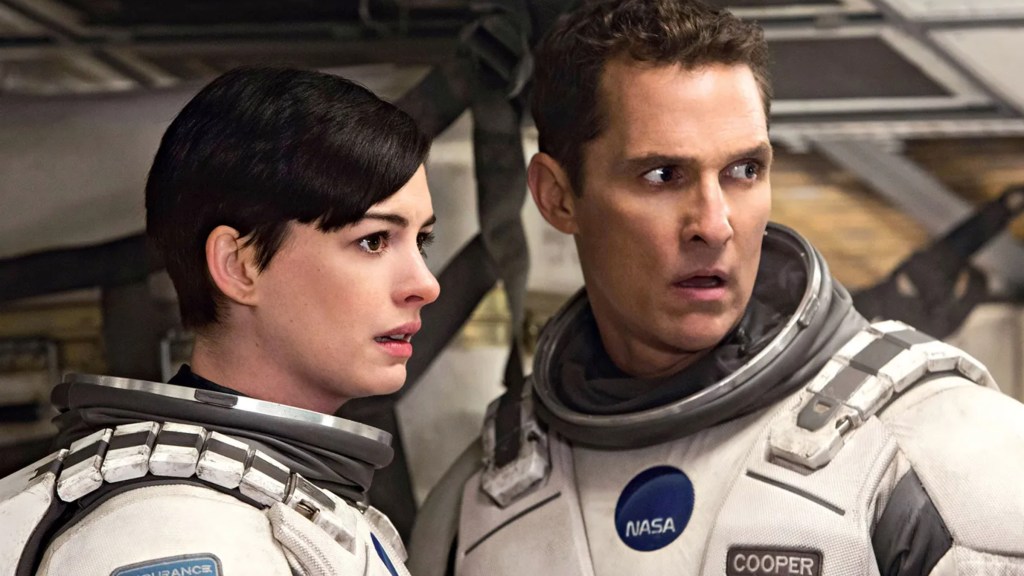
As well as being known for regularly working with the same actors, Christopher Nolan has earned a reputation for delivering mind-bending sci-fi movies. One such example is 2014’s Interstellar, which concerns a near-future dying Earth and its last-ditch mission to send astronauts to find a new home among the stars. Its story starts in one time and place, only to branch into two separate timelines, one following the astronauts on their mission and the other following the people they left behind on Earth.
The theory of relativity comes into play in a major way, leading to a divergence in the time frames of the two simultaneous stories of Cooper and his daughter, Murph. The third-act reveal that Cooper used an anomaly created by advanced humans to communicate with his daughter across time and space redefines Interstellar‘s whole story in a subtle but satisfying way. Rewatching the movie a second time allows the viewer to experience its story while also wrapping their head around the complexities of the science involved, allowing them to better understand its logic.
2) Looper (2012)
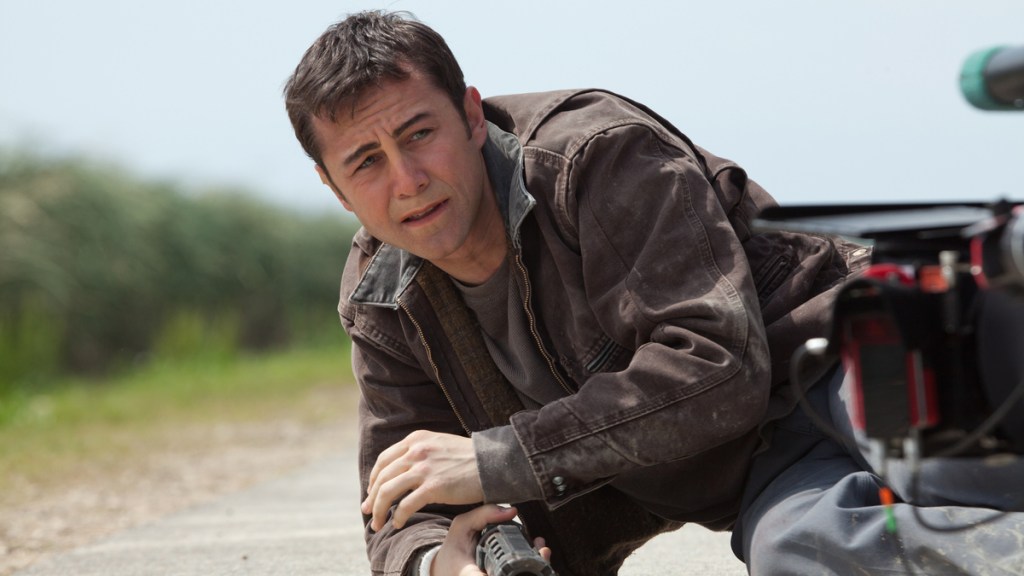
There are many great movies about time travel, and they all tend to take a slightly different approach to the idea. 2012’s Looper put a unique spin on the concept, as it imagined time travel as a one-way journey made illegal after its discovery and used by criminals to effectively assassinate and dispose of people without being detected. Its story sees Joseph Gordon-Levitt’s Joe be given his final job, which is to assassinate his future self (played by Bruce Willis), a task known as closing his own loop.
Future Joe’s escape sets into motion a series of events that eventually ends with both Young and Old Joe’s deaths in a shocking ending. Realizing that his future self is intent on killing an innocent child to prevent his future as a powerful telekinetic, Young Joe chooses to end his own life in order to save the boy. It’s a clever ending to a complex story, and one that needs to be carefully considered more than once before it can be completely understood on a broader level.
3) 12 Monkeys (1995)
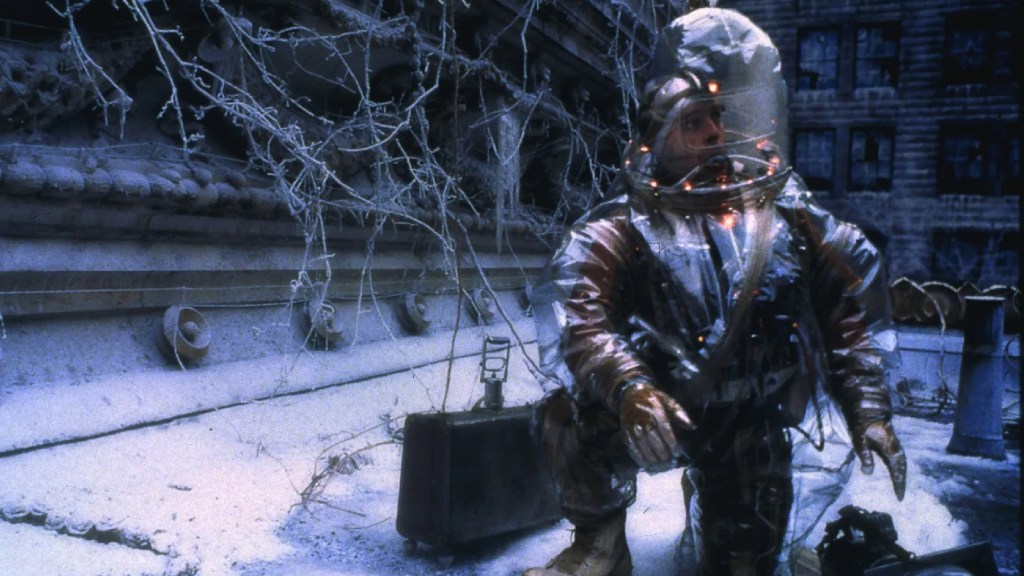
12 Monkeys is a movie that isn’t mentioned enough when it comes to great time travel stories. One of Bruce Willis’ best sci-fi movies, 12 Monkeys stars Willis as James Cole, a prisoner in a future in which the Earth has been ravaged by a deadly virus, forcing the surviving population underground. Sent back to the mid-1990s to prevent the outbreak of the virus, Cole realizes too late that he’s stuck in a causality loop that ends with his own death, and that he can’t stop the outbreak.
12 Monkeys foreshadows its ending from early on, with Cole remembering witnessing a man being shot and killed at an airport as a boy. The reveal that the man in question was actually Cole himself repaints the movie’s entire narrative, and causes it to be watched from a different perspective the second time around. Knowing that Cole’s arrival in the past was effectively predetermined, the viewer begins to see the ways that his presence actually contributes to the outbreak, making 12 Monkeys‘ story seem even more bleak on repeat viewings.
4) Inception (2010)

Christopher Nolan’s Inception is a notoriously intricate feat of storytelling. Following dream infiltrator Dom Cobb as he is tasked with implanting an idea in the subconscious of a target, Inception sees Cobb and his team embark on a reverse heist into the mind of a powerful businessman. The movie taking place in various dream sequences lends itself to mind-bending visuals, and a plot that grows increasingly complex as it goes along.
While Inception doesn’t end with a major twist in the same way that many other sci-fi movies do, its ambiguous final shot combined with the complexity of its narrative mean that most viewers need multiple viewings. Following Cobb’s plan as they attempt to plant the seed of an idea is one thing, but factoring in the final moment, in which it is revealed that Cobb may still be in a dream, requires another watch. The second viewing is necessary to search for visual clues as to exactly what the final shot means, causing the viewer to delve deeper much as Cobb and his team were forced to do.
5) 2001: A Space Odyssey (1968)
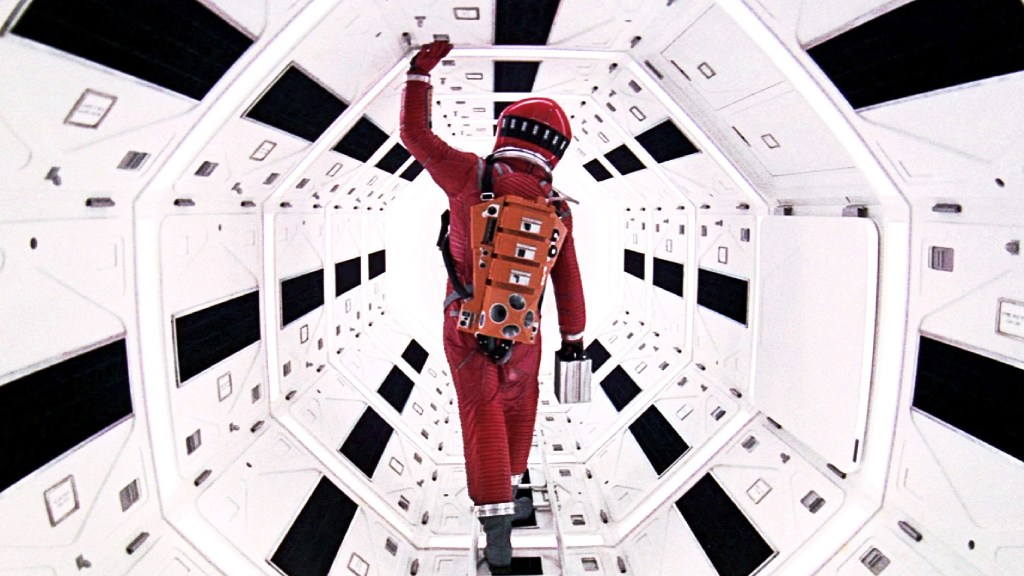
2001: A Space Odyssey is an iconic piece of sci-fi history and is widely considered one of Stanley Kubrick’s greatest movies. As well as featuring a terrifying sci-fi movie robot, the movie’s presentation and narrative thrust often leads viewers to revisit it in the hopes of better understanding its story. Its narrative follows a space mission in which two astronauts are threatened by their rogue ship’s computer, as well as several other seemingly disconnected sequences.
The non-linear and borderline experimental presentation of 2001: A Space Odyssey has contributed to its reputation as one of the most confusing movies ever made. By the time its ending comes around, the majority of its audience is thoroughly baffled, though its striking visuals and music lend themselves well to repeat viewings. Whether a second watch actually helps the viewer better understand Kubrick’s vision is debatable, but it’s certainly a movie that warrants more consideration than a single watch-through can provide.
6) Primer (2004)
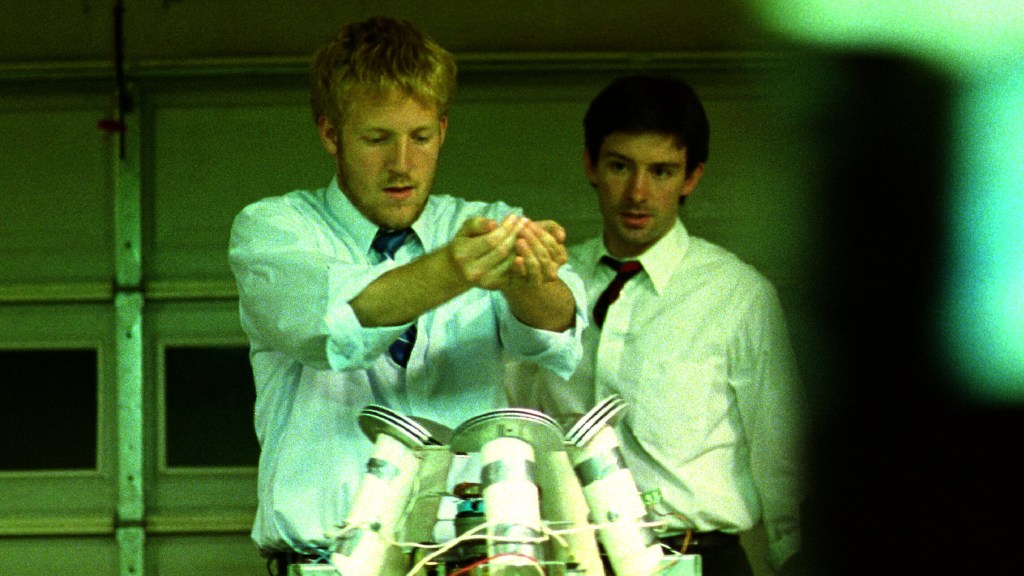
Not all mind-bending sci-fi has to be big-budget fare, as proven by 2004’s Primer. An independent movie, Primer follows two scientists who discover time travel, only to learn of the impossible complexities that it creates. One of the most underrated sci-fi movies of the 2000s, Primer‘s complicated plot generally requires multiple viewings to unpick from a logical standpoint.
Much of Primer‘s appeal stems from the intricacies of its plot. The rich depth of narrative that its time travel story creates is a key element of the movie, as well as something that makes it almost too complex to fully unpack in a single viewing. Primer‘s examination of time travel and the repercussions of travelling through time is something that adds huge depth to its story, which viewers are all but forced to re-examine in order to work out exactly what the movie is implying about its characters and their motivations.
7) Donnie Darko (2001)

Though it isn’t necessarily considered among the most terrifying sci-fi movies ever made, 2001’s Donnie Darko is a deeply unnerving film. Its story involves the titular character narrowly escaping death while sleepwalking, and then subsequently being visited by a mysterious man in a rabbit costume who tells him that the world will end in 28 days. The story that follows is a perplexing one, and the true meaning of its ending is something that has been hotly debated for years.
As the movie ends with Donnie’s death, it implies that his actions throughout the movie were superfluous, and that he chose to die in order to save the life of his girlfriend, Gretchen. The abrupt nature of its final revelation is especially confusing, and often leads viewers to rewatch the film in order to better understand its meaning. As a complex movie involving elements of mental illness and quantum theory, Donnie Darko is a film unlikely to be fully understood after a single viewing.
8) Coherence (2013)
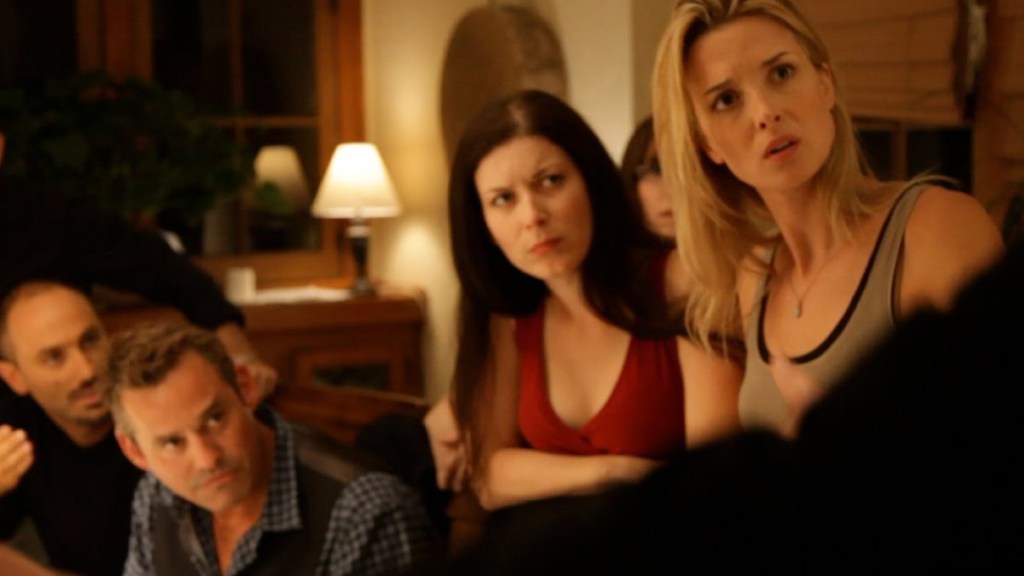
2013’s Coherence isn’t a sci-fi movie that dominates conversations around the genre’s most interesting entries, but it deserves to be. It concerns a group of eight adult friends who get together for a dinner party, with all the expected dramatic tensions that come with such relationships. However, during the party, a comet passes overhead, bringing with it cosmic happenings that drastically alter their reality – or, at least, their perception of it.
Coherence is one of the most mind-boggling sci-fi movies of recent years, especially as its entire premise hinges on the distortion of reality. Interpreting exactly what the events depicted in the movie signify is no small task, and a second viewing is all but mandatory for understanding its meaning. Watching closely for even the most minute of details comes into play the second time around in order to better decipher its complex, mind-bending story.
9) Arrival (2016)

Director Denis Villeneuve’s first attempt at sci-fi proved to be a resounding success, with 2016’s Arrival a hit with critics and audiences alike. Adapted from Ted Chiang’s short story “Story of Your Life,” it follows Louise Banks, a linguist brought in to decipher the pictographic language used by alien arthropods who have landed at various locations on Earth. Interspersed with scenes showing various moments in Banks’ life, Arrival‘s conclusion is one that turns the entire movie upside down.
Part of the sci-fi movie’s perfect ending involves Banks’ realization that the alien language is read from both ends then leading to the epiphany that they perceive time both forward and backward. This redefines Banks’ supposed flashbacks, which are revealed to in fact be flash forwards, giving the audience glimpses into a life she had not yet lived. It’s a final twist that practically forces the viewer to rewatch the entire movie from a new perspective, making Arrival a rewarding and cerebral watch.
10) Tenet (2020)
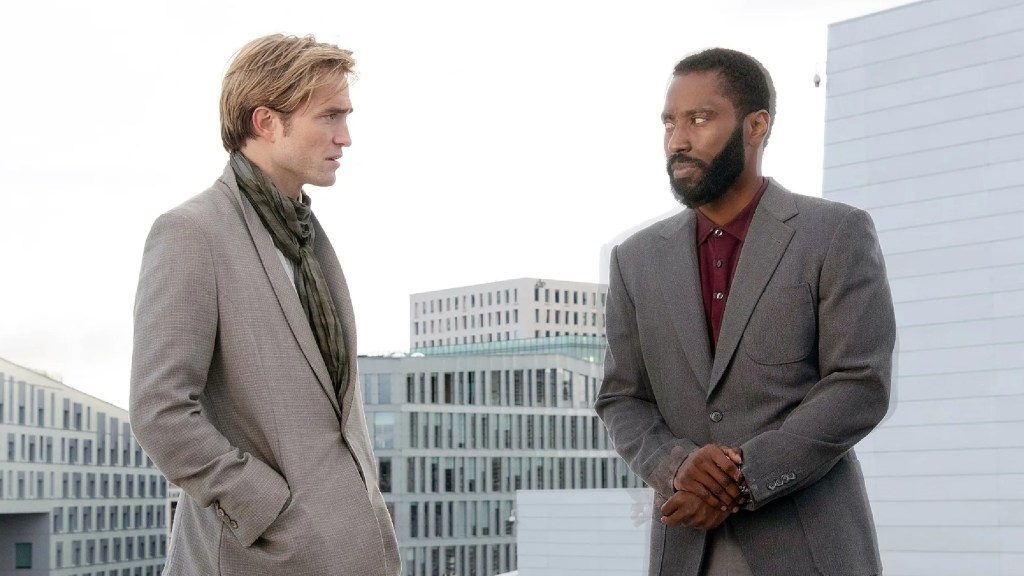
Christopher Nolan has made many mind-bending movies, but none are quite as complex as 2020’s Tenet. It stars John David Washington as the Protagonist, a man recruited into a secret organization tasked with locating the origin of objects traveling backward through time. Tenet‘s story involves the exploration of time realignment technology, which inverts an object’s properties so that it experiences time in reverse.
Tenet is a movie that has become notoriously complex to understand. It requires the viewer to wrap their mind around a completely foreign concept, and then apply layers of logic to it in order to fully grasp the movie’s plot. Its final reveal of the leader of the organization is both clever and deceptively obvious, but it’s still enough to make the viewer want to rewatch the whole movie in order to better understand its story. Tenet is perhaps the epitome of a movie that needs to be rewatched to understand, not least because the key to deciphering its story isn’t revealed until the very end.









